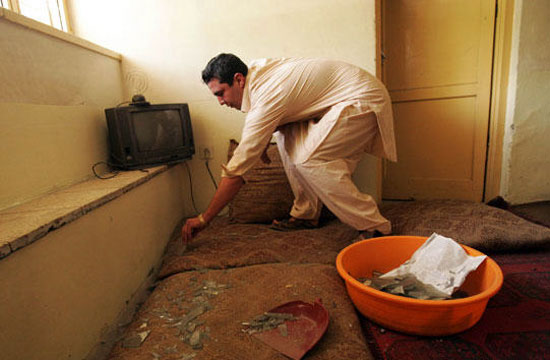By Abdul Haleem
After years of living in peace, the residents of Afghan capital Kabul were shocked in bed as seven rockets fired by militants hit residential areas early Tuesday morning.
 |
|
The residents of Afghan capital Kabul were shocked in bed as seven rockets fired by militants hit residential areas early Tuesday morning.?[Xinhua] |
The rockets, which according to Interior Ministry, wounded at least two civilians and were fired from Deh Sabz area, some 15 km north of capital city, speak of influencing Taliban clouting at the gates of war-torn capital while the country is going towards elections.
This is the first time after almost one year that the fortified Afghan capital came under rocket attacks reminding the bitter factional fighting decades ago.
Situated between Kabul and Bagram, the headquarters of U.S.-led Coalition forces in Afghanistan, Deh Sabz's muddy hilltops are often frequented by U.S. military convoys.
Bagram, 50 km north of Kabul, has several times come under Taliban attacks but Tuesday morning's rocket attacks can be interpreted as a warning shoot ahead of August 20 presidential election.
Taliban purported spokesman Zabihullah Mujahid in talks with media from undisclosed location claimed of responsibility, saying militants by firing rockets on Kabul demonstrated their ability to derail the coming presidential election.
Targeting Kabul with barrage of rockets in the presence of thousands of Afghan and international troops indicates spearheading Taliban-led insurgency which has caused panic among locals.
"If NATO were able to contain militancy, today (Tuesday) Kabul had not been attacked by rockets," a roadside vender Jamaludin said.
Meantime, the increasing militancy have made politicians in Europe and United States to worry about the situation and its perspective in Afghanistan.
Jaap De Hoop Scheffer, the former Secretary General of NATO, according to media reports before quitting office said in London last month, "If we were to walk away, Afghanistan would fall to the Taliban, with devastating effect for the people there -- women in particular."
Scheffer, according to media reports, also warned that in case of failure of mission in Afghanistan, "Pakistan would suffer the consequences. Central Asia would see extremism spread. Al Qaida would have a free run again, and their terrorist ambitions are global."
Taliban-linked insurgency has been on constant rise over the past three years. The militants in attempt to boost clouts and reduce military pressure have shifted gun from their traditional base in the south to the relatively peaceful Northern provinces.
To contain militancy, the United States would complete sending in 21, 000 additional troops to Afghanistan by the year's end, bringing the strength of U.S. military to 68,000 and thus the strength of NATO-led International Security Assistance Force (ISAF) would surpass 90,000 by the end of 2009.
Taliban fighters have proved serious challenging for the international troops as their activities have been spreading.
Only in July, 75 international troops with majority of them from U.S. and Britain had been killed in Taliban-linked activities while so far this month in August seven NATO soldiers lost their lives in roadside bombings and hostile fire.
Spokesman of Pentagon in Washington, Geoff Morrell, according to media reports, said that in July the U.S. has lost troops in Afghanistan "at an alarming rate."
Failing to curb insurgency in Afghanistan has also worried Australia, a key contributor in war on terror, as Australian Defense Forces Chief Angus Houston has warned that, "If foreign forces pull out of Afghanistan now, the likely result would be civil war that the Taliban would probably win."
Corroborating the notion NATO's new chief Anders Fogh Rasmussen, after assuming office on August 1 repeated the alliance firm support in war against militants in Afghanistan.
The new Secretary General of the western military alliance in his remarks, according to media reports, in addition to calling for strong European support to Afghanistan, assured U.S. should not feel alone in war against Taliban and al-Qaida network.
Nevertheless, Taliban-linked insurgency and violent incidents would increase as long as the date for election is drawing closer as the militants have vowed to disrupt the electoral process.
The radical outfit, in a statement last Thursday, described the coming August 20 Afghan presidential election as a "U.S. sponsored project" and called on Afghans to boycott it and join Jihad or holy war to derail the democratic process.
(Xinhua News Agency August 5, 2009)